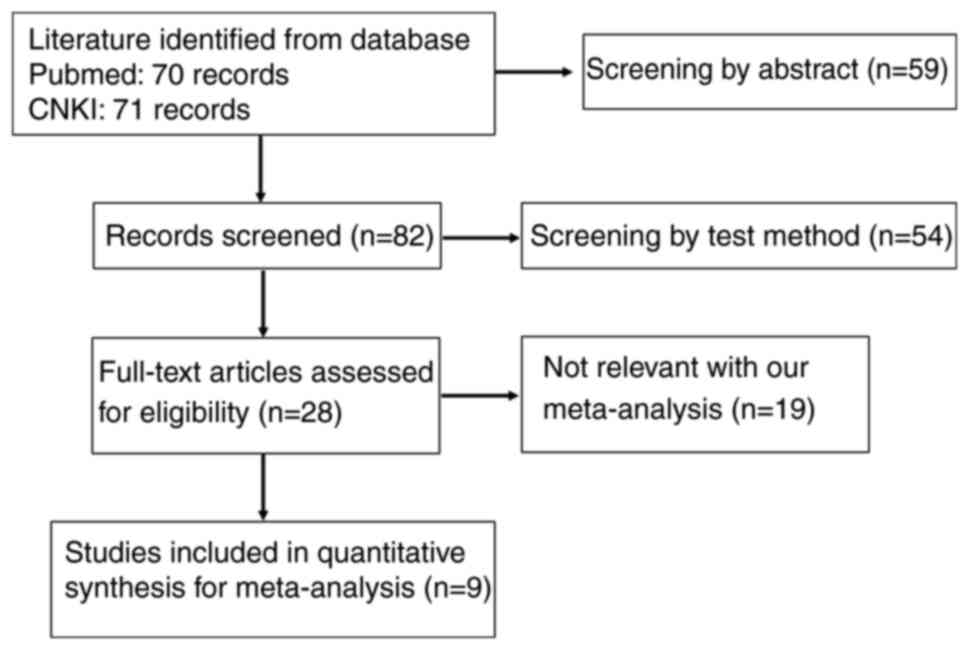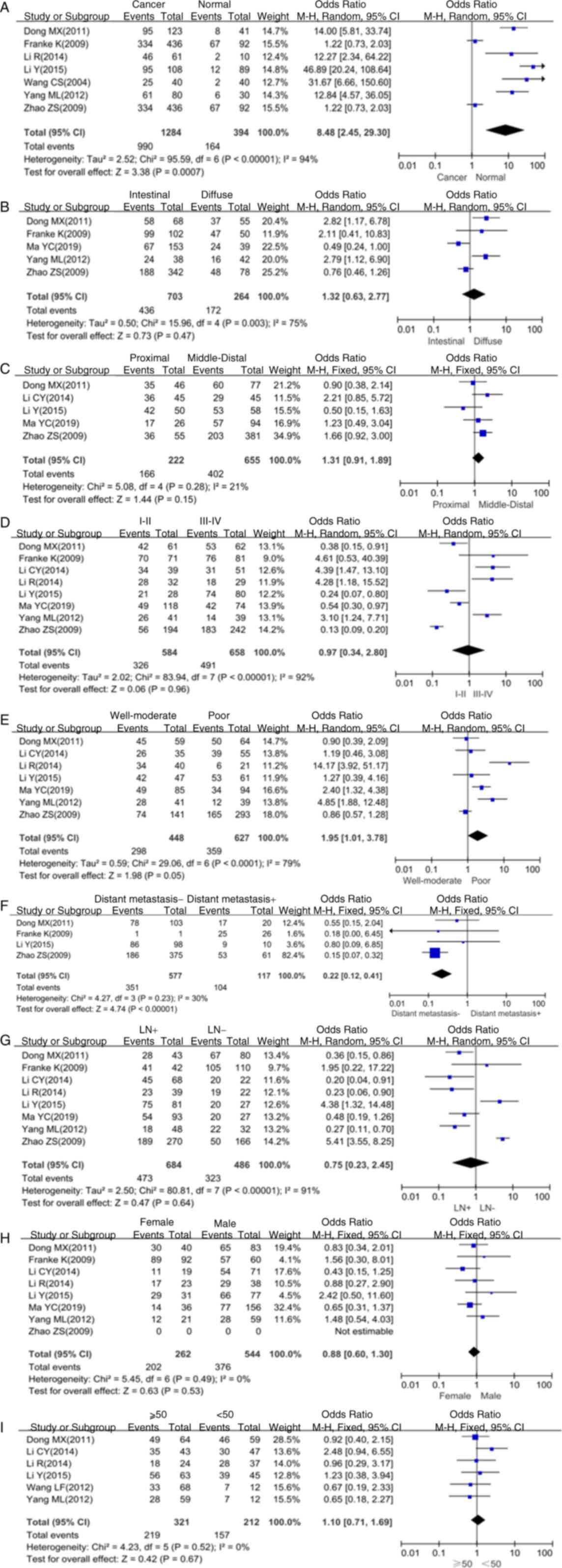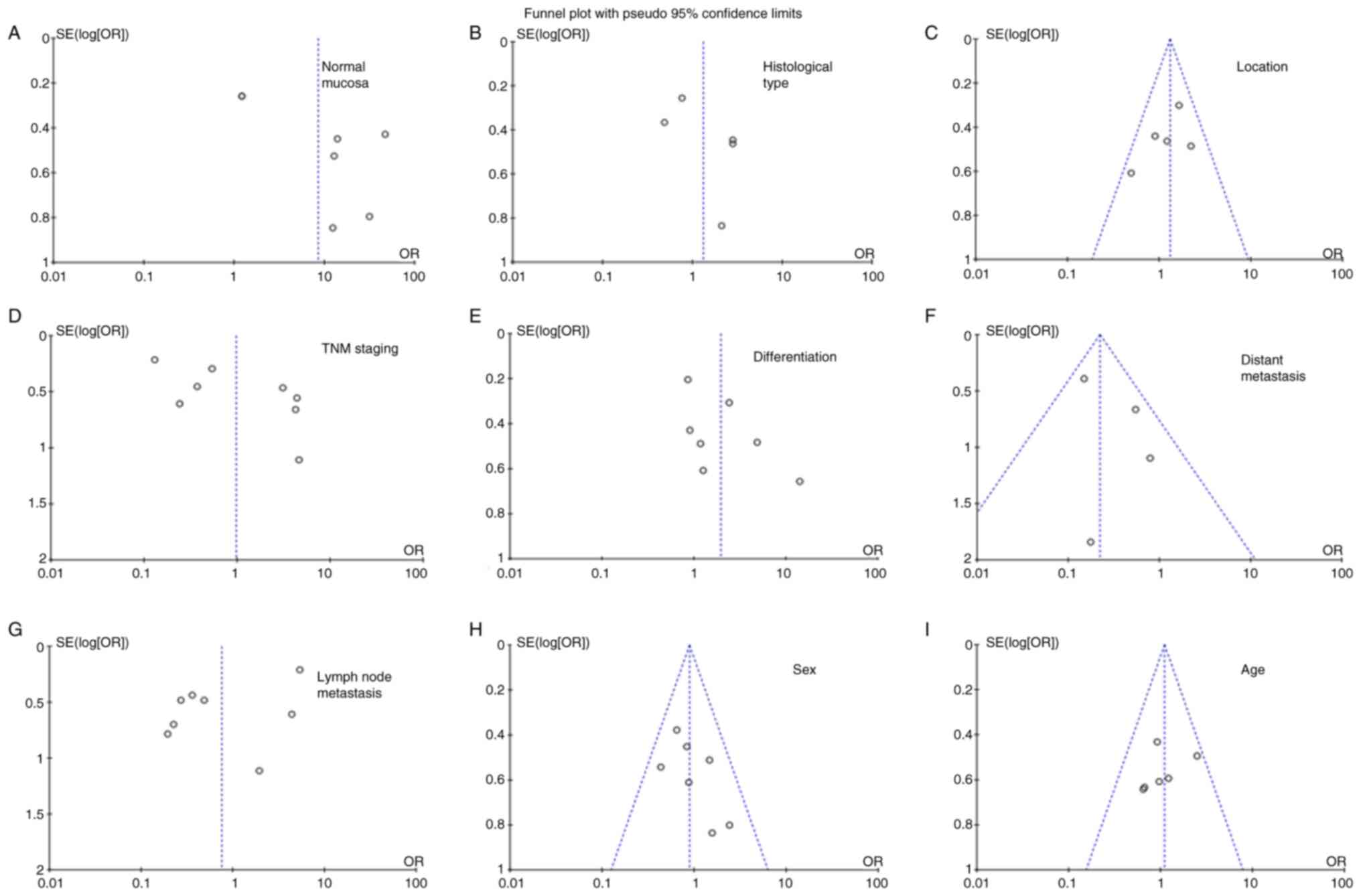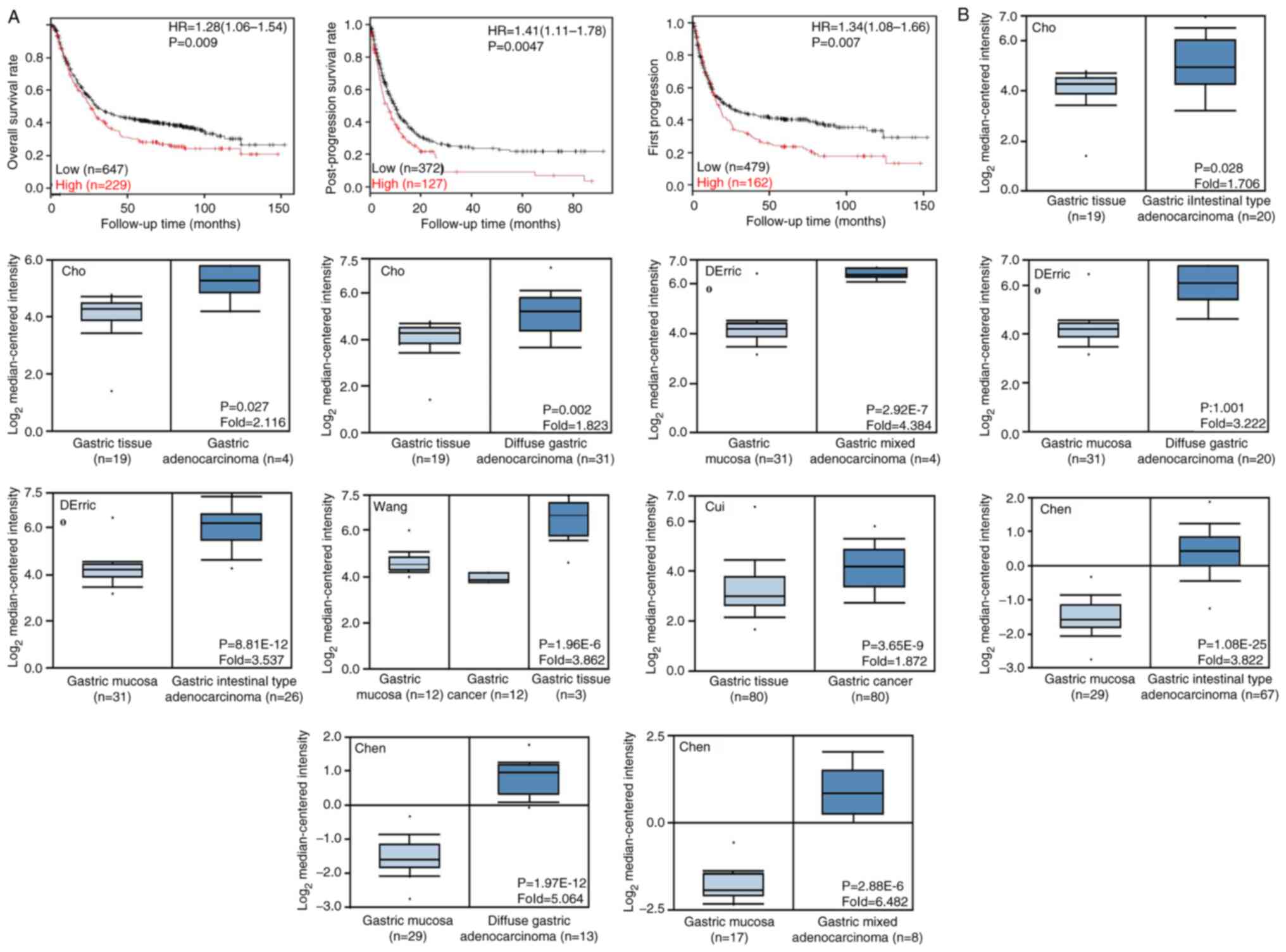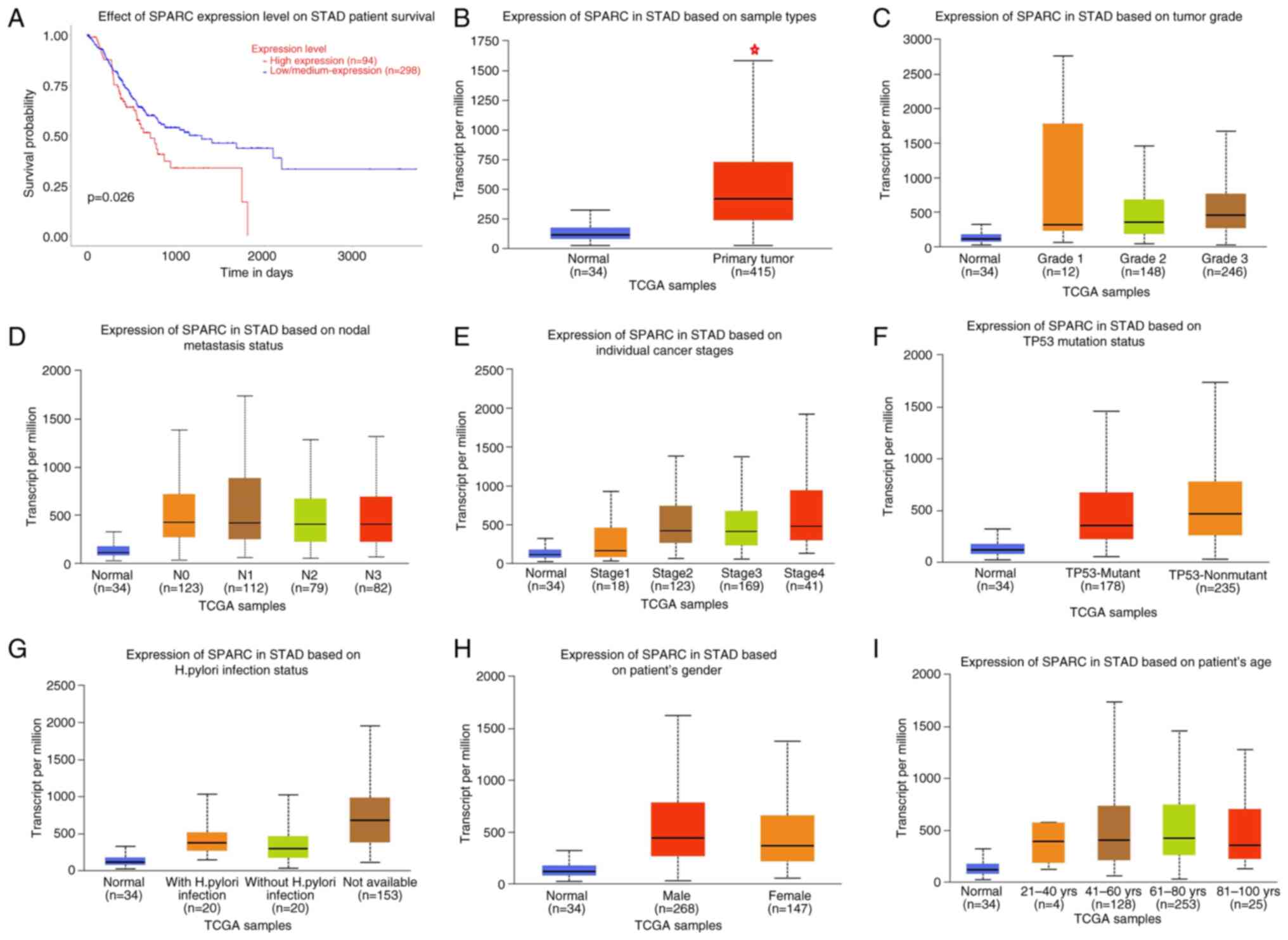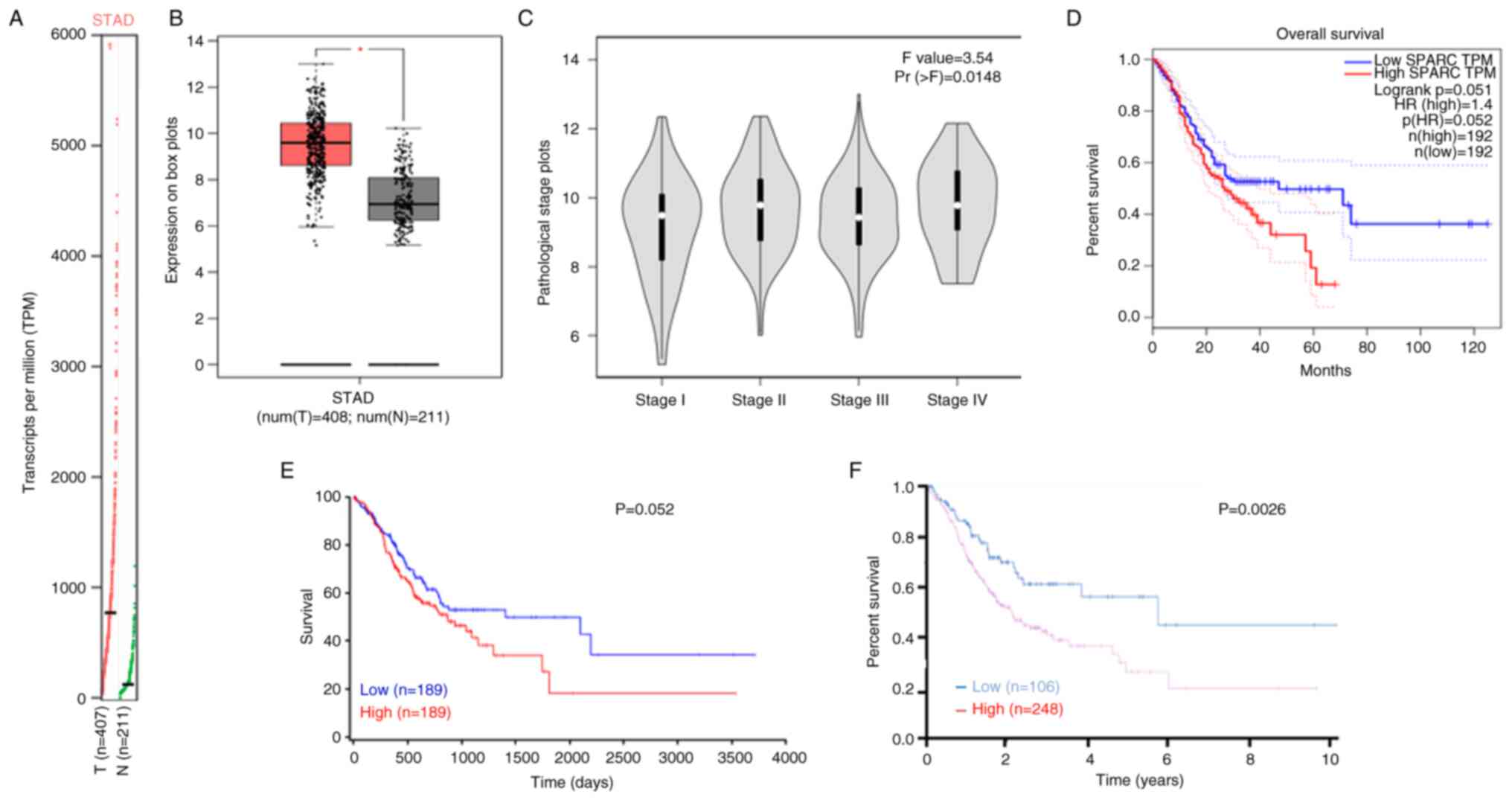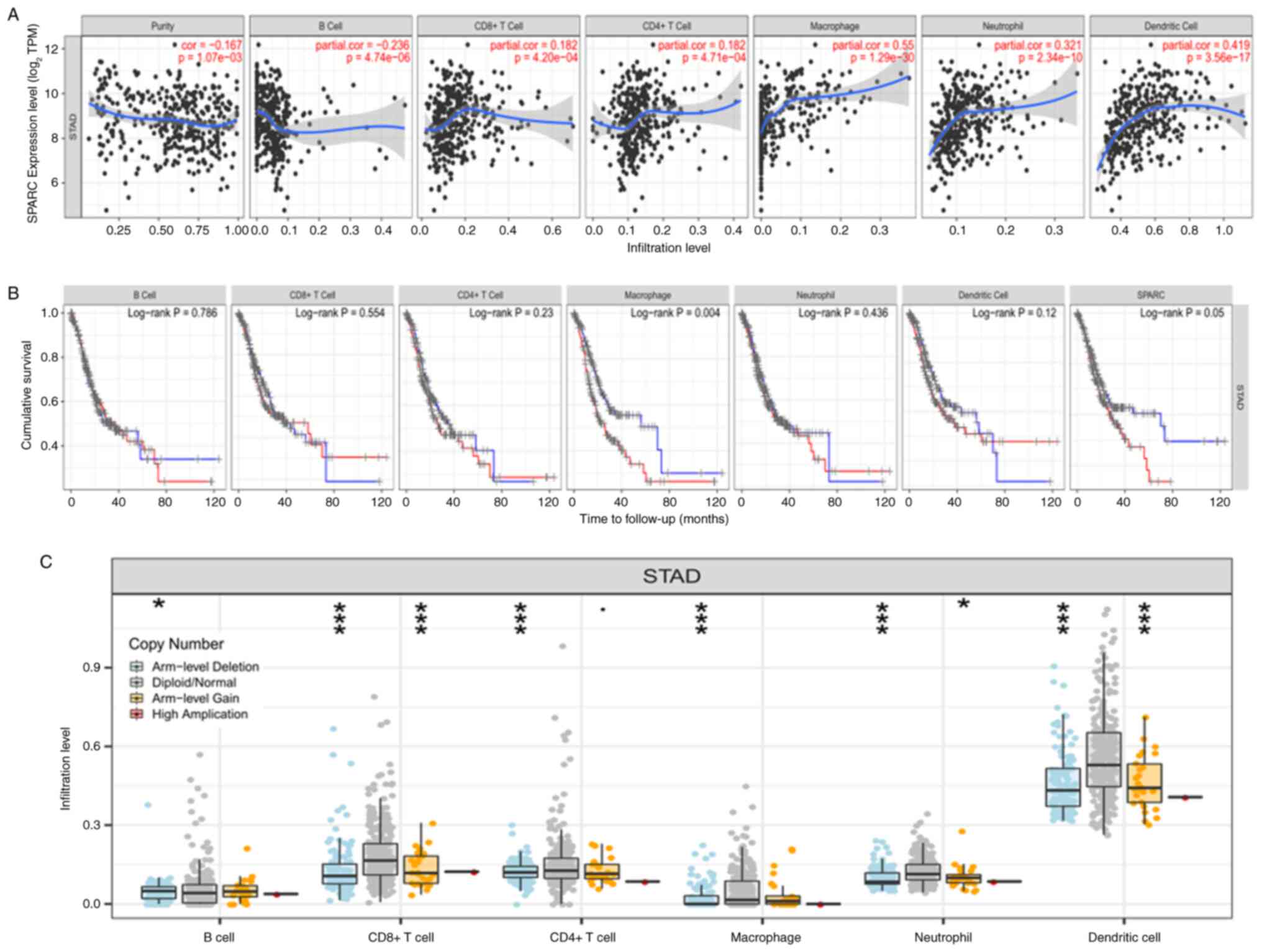|
1
|
Bray F, Ferlay J, Soerjomataram I, Siegel
RL, Torre LA and Jemal A: Global cancer statistics 2018: GLOBOCAN
estimates of incidence and mortality worldwide for 36 cancers in
185 countries. CA Cancer J Clin. 68:394–424. 2018. View Article : Google Scholar : PubMed/NCBI
|
|
2
|
Zuo TT, Zheng RS, Zeng HM, Zhang SW and
Chen WQ: Epidemiology of stomach cancer in China. Chin J Clin
Oncol. 44:52–59. 2017.(In Chinese).
|
|
3
|
Han W, Xu XX, He DW, Cao F and Ding HZ:
Effect of SPARCL1 gene on the proliferation and apoptosis of
hepatocellular carcinoma SMMC-7721 cells. J Jiangsu Univ.
26:52016.(In Chinese).
|
|
4
|
Chun Y, Yamakoshi Y, Kim JW, Iwata T, Hu
JCC and Simmer JP: Porcine SPARC: Isolation from dentin, cDNA
sequence, and computer model. Eur J Oral Sci. 114:78–85. 2010.
View Article : Google Scholar : PubMed/NCBI
|
|
5
|
Yiu GK, Chan WY, Ng SW, Chan PS, Cheung
KK, Berkowitz RS and Mok SC: SPARC (secreted protein acidic and
rich in cysteine) induces apoptosis in ovarian cancer cells. Am J
Pathol. 159:609–622. 2001. View Article : Google Scholar : PubMed/NCBI
|
|
6
|
Rotllant J, Liu D, Yan YL, Postlethwait
JH, Westerfield M and Du SJ: Sparc (Osteonectin) functions in
morphogenesis of the pharyngeal skeleton and inner ear. Matrix
Biol. 27:561–572. 2008. View Article : Google Scholar : PubMed/NCBI
|
|
7
|
Ji R, Zhou YN, Ren TW, Zhang ZY and Li Q:
Expression and clinical significance of MMP-9 in gastric cancer and
metastatic lymphnodes. Chin J Clin Oncol. 37:377–380. 2010.(In
Chinese).
|
|
8
|
De S, Chen J, Narizhneva NV, Heston W,
Brainard J, Sage EH and Byzova TV: Molecular pathway for cancer
metastasis to bone. J Biol Chem. 278:39044–39050. 2003. View Article : Google Scholar : PubMed/NCBI
|
|
9
|
Yang ML, Zhai LL, Ma LH, et al: Expression
of SPARC and VEGF in Gastric Carcinoma and Their Relationship with
Angiogenesis. J Diag Pathol. 19:52–55. 2012.(In Chinese).
|
|
10
|
Li CY and Gu KS: Expression of CD133,
SPARC and ARID1A in gastric cancer and its clinical significance.
Chin Clin Oncol. 19:411–416. 2014.(In Chinese). PubMed/NCBI
|
|
11
|
Wang GM, Yuan YP, Zhao CX and Song XL:
Expression and significance of MMP-2, MMP-9 and VEGF in colon
carcinoma tissues. Chin J Cancer Prevent Treat. 18:1267–1269.
2011.(In Chinese).
|
|
12
|
Nishie A, Masuda K, Otsubo M, Migita T,
Tsuneyoshi M, Kohno K, Shuin T, Naito S, Ono M and Kuwano M: High
expression of the Cap43 gene in infiltrating macrophages of human
renal cell carcinomas. Clin Cancer Res. 7:2145–2151.
2001.PubMed/NCBI
|
|
13
|
Thomas R, True LD, Bassuk JA, Lange PH and
Vessella RL: Differential expression of osteonectin/SPARC during
human prostate cancer progression. Clin Cancer Res. 6:1140–1149.
2000.PubMed/NCBI
|
|
14
|
Wells GA, She B, O'Connell D, Peterson J,
Welch V, Losos M and Tugwell P: The Newcastle-Ottawa Scale (NOS)
for assessing the quality of non-randomised studies in
meta-analyses. https://www.ohri.ca/programs/clinical_epidemiology/oxford.aspMay
13–2022
|
|
15
|
Li R: Expression of protein Smad3, HER2,
SPARC in gastric cancer tissues and its relation with long-term
efficacy. Shanghai Med Pharm J. 35:32014.(In Chinese).
|
|
16
|
Li Y, Wu JF, Zhang H, Qin R and Wang DB:
Expression of SPARC in gastric cancer tissues. Acta Universitatis
Medicinalis Anhui. 41:626–628. 2006.(In Chinese).
|
|
17
|
Dong MX, Yang YH and Yu JX: Expression of
SPARC in gastric carcinoma and clinical significance. Med J Qilu.
26:105–108. 2011.(In Chinese).
|
|
18
|
Ma Y, Zhu J, Chen S, Ma J, Zhang X, Huang
S, Hu J, Yue T, Zhang J, Wang P, et al: Low expression of SPARC in
gastric cancer-associated fibroblasts leads to stemness
transformation and 5-fluorouracil resistance in gastric cancer.
Cancer Cell Int. 19:1372019. View Article : Google Scholar : PubMed/NCBI
|
|
19
|
Franke K, Carl-Mcgrath S, Rhl FW, Röhl FW,
Lendeckel U, Ebert MP, Tänzer M, Pross M and Röcken C: Differential
expression of SPARC in intestinal-type gastric cancer correlates
with tumor progression and nodal spread. Transl Oncol. 2:310–320.
2009. View Article : Google Scholar : PubMed/NCBI
|
|
20
|
Wang CS, Lin KH, Chen SL, Chan YF and
Hsueh S: Overexpression of SPARC gene in human gastric carcinoma
and its clinic-pathologic significance. Br J Cancer. 91:1924–1930.
2004. View Article : Google Scholar : PubMed/NCBI
|
|
21
|
Zhao ZS, Wang YY, Chu YQ, Ye ZY and Tao
HQ: SPARC is associated with gastric cancer progression and poor
survival of patients. Clin Cancer Res. 16:260–268. 2009. View Article : Google Scholar : PubMed/NCBI
|
|
22
|
Huang HB, Zhao Y and Yang SJ: Research
progress of SPARC in esophageal cancer. J Int Oncol. 41:42014.
|
|
23
|
Brekken RA and Sage EH: SPARC, a
matricellular protein: At the crossroads of cell-matrix
communication. Matrix Biol. 19:816–827. 2001. View Article : Google Scholar : PubMed/NCBI
|
|
24
|
Kupprion C, Motamed K and Sage EH: SPARC
(BM-40, osteonectin) inhibits the mitogenic effect of vascular
endothelial growth factor on microvascular endothelial cells. J
Biol Chem. 273:29635–29640. 1998. View Article : Google Scholar : PubMed/NCBI
|
|
25
|
Socha MJ, Said N, Dai Y, Kwong J,
Ramalingam P, Trieu V, Desai N, Mok SC and Motamed K: Aberrant
promoter methylation of sparc in ovarian cancer. Neoplasia.
11:126–135. 2009. View Article : Google Scholar : PubMed/NCBI
|
|
26
|
Feng Y, Yang X and Wang XB: Research
advances in secreted protein acidic and rich in cysteine in
hepatocellular carcinoma. J Clin Hepatol. 34:419–423. 2018.
|
|
27
|
Ouyang HY, Le Y, Zhang YF, Guo RP and Shi
M: Expression of SPARCL1 in primary hepatocellular carcinoma and
its clinical significance. Pract J Cancer. 31:32016.
|
|
28
|
Zheng XW, Li WX and Liu JF: Relationship
of bcl-2 expression with SPARC expression in hepatocellular
carcinoma and their correlation with recurrence, metastasis and
prognosis. Chin J Modern Med. 23:42013.(In Chinese).
|
|
29
|
Jiang DL, Cao SQ and Jiang YL: Expression
and clinical significance of secreted protein acidic and rich in
cysteine and matrix metalloproteinase-2 in human colorectal
carcinoma and colorectal adenoma. J Clin Int Med. 34:42017.(In
Chinese).
|
|
30
|
Liang JF, Wang HK, Hong X, Li N, Cheng CX,
Zhao YZ, Ma YB, Gao JZ, Bai RB and Zheng HX: Relationship and
prognostic significance of SPARC and VEGF protein expression in
colon cancer. J Exp Clin Cancer Res. 29:1–11. 2010. View Article : Google Scholar : PubMed/NCBI
|
|
31
|
Nischt R, Wallich M, Reibetanz M, Baumann
P, Krieg T and Mauch C: BM-40 and MMP-2 expression are not
coregulated in human melanoma cell lines. Cancer Lett. 162:223–230.
2001. View Article : Google Scholar : PubMed/NCBI
|
|
32
|
Said N, Frierson HF Jr, Chernauskas D,
Conaway M, Motamed K and Theodorescu D: The role of SPARC in the
TRAMP model of prostate carcinogenesis and progression. Oncogene.
28:3487–3498. 2009. View Article : Google Scholar : PubMed/NCBI
|
|
33
|
Shi S, Ma HY, Han XY, Sang YZ, Yang MY and
Zhang ZG: Prognostic significance of SPARC expression in breast
cancer: A meta-analysis and bioinformatics analysis. Bio Res Int.
15:86004192022.PubMed/NCBI
|
|
34
|
Minn AJ, Gupta GP, Siegel PM, Bos PD, Shu
W, Giri DD, Viale A, Olshen AB, Gerald WL and Massagué J: Genes
that mediate breast cancer metastasis to lung. Nature. 436:518–524.
2005. View Article : Google Scholar : PubMed/NCBI
|
|
35
|
Yin J, Chen G, Liu Y, Liu S, Wang P, Wan
Y, Wang X, Zhu J and Gao H: Downregulation of SPARC expression
decreases gastric cancer cellular invasion and survival. J Exp Clin
Cancer Res. 29:592010. View Article : Google Scholar : PubMed/NCBI
|
|
36
|
Jie Y, Chen GW, Si L and Liu YC: Effects
of SPARC on the invasion ability and MMP-2 expression of gastric
cancer cell line HGC27 in vivo. Chin Med Guide. 8:1387–1388.
2010.(In Chinese).
|
|
37
|
Chen ZY, Zhang JL, Yao HX, Wang PY, Zhu J,
Wang W, Wang X, Wan YL, Chen SW, Chen GW and Liu YC: Aberrant
methylation of the SPARC gene promoter and its clinical implication
in gastric cancer. Sci Rep. 4:70352014. View Article : Google Scholar : PubMed/NCBI
|
|
38
|
Liao P, Li W, Liu R, Teer JK, Xu B, Zhang
W, Li X, Mcleod HL and He Y: Genome-scale analysis identifies
SERPINE1 and SPARC as diagnostic and prognostic biomarkers in
gastric cancer. Onco Targets Ther. 11:6969–6980. 2018. View Article : Google Scholar : PubMed/NCBI
|
|
39
|
Li L, Zhu Z, Zhao Y, Zhang Q, Wu X, Miao
B, Cao J and Fei S: FN1, SPARC, and SERPINE1 are highly expressed
and significantly related to a poor prognosis of gastric
adenocarcinoma revealed by microarray and bioinformatics. Sci Rep.
9:78272019. View Article : Google Scholar : PubMed/NCBI
|
|
40
|
Sato T, Oshima T, Yamamoto N, Yamada T,
Hasegawa S, Yukawa N, Numata K, Kunisaki C, Tanaka K, Shiozawa M,
et al: Clinical significance of SPARC gene expression in patients
with gastric cancer. J Surg Oncol. 108:364–368. 2013. View Article : Google Scholar : PubMed/NCBI
|
|
41
|
Wang L, Yang M, Shan L, Qi L, Chai C, Zhou
Q, Yao K, Wu H and Sun W: The role of SPARC protein expression in
the progress of gastric cancer. Pathol Oncol Res. 18:697–702. 2012.
View Article : Google Scholar : PubMed/NCBI
|















